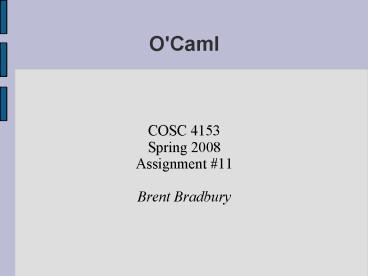O'Caml - PowerPoint PPT Presentation
1 / 11
Title:
O'Caml
Description:
let result = ChemParse.input Lexer.token lexbuf in. print_endline ... with Lexer.Eof - exit 0. Integer operators. Float operators. More Syntax and Semantics ... – PowerPoint PPT presentation
Number of Views:121
Avg rating:3.0/5.0
Title: O'Caml
1
O'Caml
- COSC 4153
- Spring 2008
- Assignment 11
- Brent Bradbury
2
Overview
- Brief history
- Syntax and semantics
- Uses of the language
- Advantages and disadvantages
- Likes and dislikes
- Conclusion
- Sources
3
Brief History
- Caml was originally an acronym for Categorical
Abstract Machine Language. - First made by INRIA, a French CS research program
- Guy Cousineau made CAML in 1987
- Xavier Leroy and Damien Doligez followed in '91
and '92 with CAML Light - Xavier Leroy released CAML Special Light in 1995,
adding a native compiler and module system
4
And finally,
- O'Caml added support for object-oriented
functional programming in 1996 - O'Caml combines standard object-oriented
techniques with the static typing and type
inference of ML
5
Basic Syntax and Semantics
( main.ml)? open ChemParse open Lexer let
_ try let lexbuf Lexing.from_channel
stdin in while true do
let result ChemParse.input Lexer.token lexbuf
in print_endline result
flush stdout done with Lexer.Eof -gt
exit 0
6
More Syntax and Semantics
let rec add x y if y 0 then x else
(add x (y - 1)) 1 let rec mult x y
if y 0 then 0 else let z (mult x (y - 1))
in add x z
- Recursive functions must be explicitly defined,
otherwise their name is outside their internal
scope - Types are not implicitly coerced. Operators,
since they are also considered functions, must
work on appropriate types.
Integer operators
Float operators
let average a b (a . b) /. 2.0
let average a b (a b) / 2
7
Uses of the Language
- Almost entirely used in academia
- Can substitute for Matlab in some applications
- Has hooks into many useful libraries (LAPACK,
OpenGL, GTK, etc.)? - Still isn't very practical for large applications
- A few small companies use O'Caml, but no one
significant
8
Advantages and Disadvantages
- Advantages
- Algorithm development is fast
- It can be compiled, and runs quickly
- Doesn't stay so functional that it can't be made
practical - Disadvantages
- It's obscure
- It lacks infrastructure for proper software
engineering - The syntax is unintuitive and hard to learn
9
Likes and Dislikes
- Likes
- Algorithms are concise
- I feel really smart whenever I make anything work
- Objects are useful and grant good flexibility.
- Dislikes
- The syntax is annoying
- Doing everything functionally is frustrating
- Static typing is frustrating, mostly.
10
Conclusion
- O'Caml is not very useful
- It's a good academic exercise, though
- I plan to write an IUPAC alkane name to NMR
Spectroscopy parser with complete unit tests,
because I have to for a job interview - I'm using ocamlyacc and ocamllex to do the
parsing - I'm using OUnit for unit testing
11
Sources
- http//www.ocaml-tutorial.org
- http//caml.inria.fr/about/history.en.html
- http//wiki.cocan.org/people/north_america

